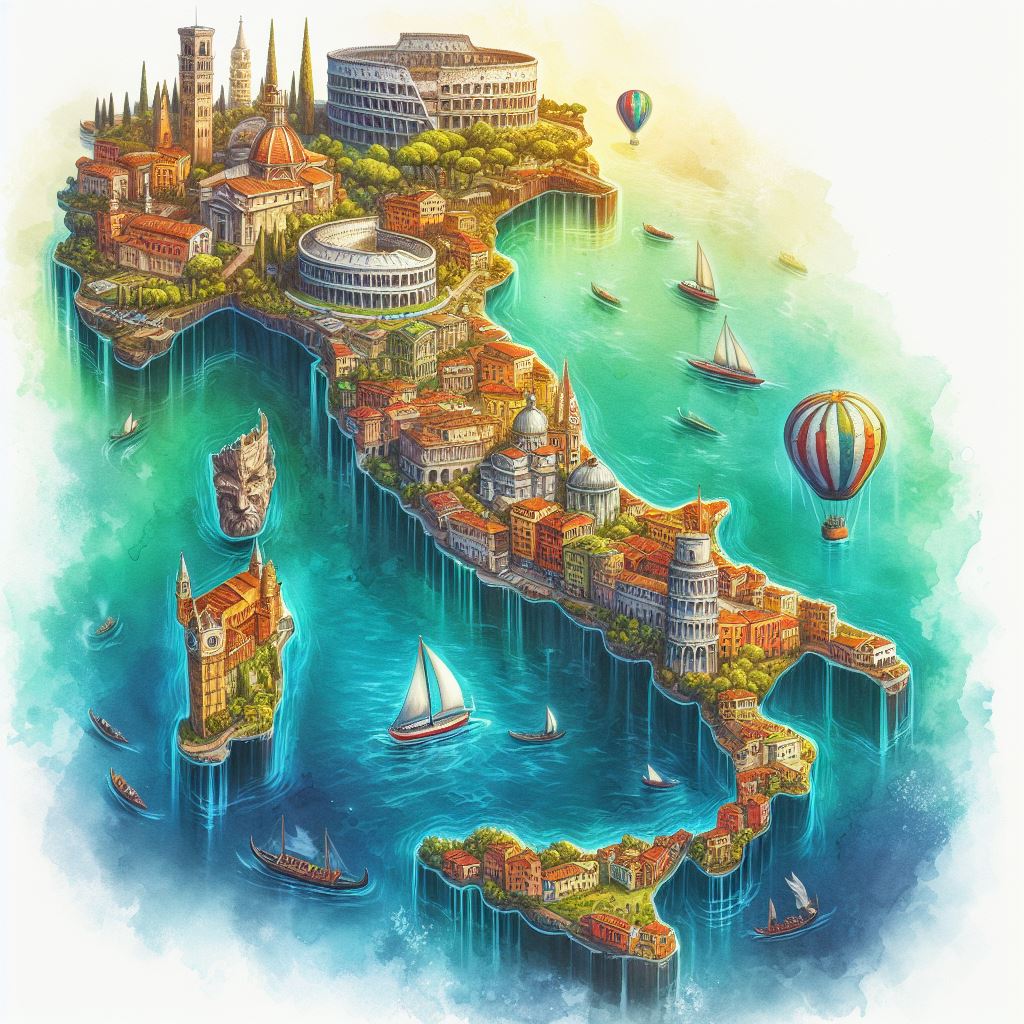Introduction
Greece is a country with an ancient past and a vibrant modern culture. This Mediterranean nation has given the world everything from early democracy to gyros, and its stunning landscapes continue to inspire travelers today. In this article, we’ll explore some fascinating Greece fun facts that reveal why it remains one of the most influential and captivating places on Earth.
The Acropolis in Athens is one of the most iconic sites in the Western world. Perched high above the city, its ancient temples like the Parthenon still capture our imaginations over 2,500 years after being built. Though earthquakes and wars have damaged these architectural marvels over the centuries, their majesty endures as a testament to Greek ingenuity.
Beyond its mythology and ruins, Greece has made remarkable contributions to the foundations of our civilization. Concepts like philosophy, democracy, mathematics, theater, and the Olympic Games all originated with the ancient Greeks. Socrates, Plato, Pythagoras, Hippocrates – these pioneering thinkers and scientists revolutionized how we see the world. Even the very structure of their language, with its alphabet and grammar, deeply influenced other tongues.
Of course, there’s much more to Greece than its antiquity. The country’s natural beauty and culinary delights have been inspiring travelers for generations. Its offshore islands like Santorini and Crete seem to overflow with postcard-perfect beaches, villages, and nightlife. And we have the Greeks to thank for delicious Mediterranean staples like feta, gyros, souvlaki, yogurt, and ouzo. Their rich folk music traditions on display at festivals and tavernas remain a highlight.
In this article, we’ll journey across this storied country to reveal the most intriguing fun facts about Greece – from the gods of Mythology to the feats of Alexander the Great, and from ancient sporting contests to modern cuisine. We’ll see why Greece had such an outsized impact on history. And we’ll explore how the spirit of this legendary land continues to captivate us today.
![Ultimate Guide to the Most Fascinating [Greece Fun Facts] - History and Culture Revealed](https://factnight.com/wp-content/uploads/2023/11/Ultimate-Guide-to-the-Most-Fascinating-Greece-Fun-Facts-History-and-Culture-Revealed.jpeg)
So join us on an adventure through one of humanity’s most influential civilizations. Together, we’ll uncover surprising truths about everything from philosophy and democracy to the Acropolis and Greek cuisine. Let’s dive into the myriad wonders of this land where so much of our world began. The captivating history of Greece awaits!
History & Mythology
Greece is the cradle of Western civilization. Its accomplishments in philosophy, governance, science, math, and the arts provided the blueprint for modern society. By exploring key eras and myths, we can better appreciate the Greeks’ timeless impact.
Ancient Greece – Foundations of Western civilization
Emerging around 800 BCE, the ancient Greek city-states like Athens and Sparta pioneered principles of philosophy, democracy, sports, architecture, and more that still shape our world. Athenians developed history’s first democratic government. Their thinkers like Socrates founded Western philosophy and logic. Greek mathematicians calculated geometry and numbers like Pi. Dramatists like Sophocles produced iconic tragedies. This efflorescence of arts and learning is known as the Golden Age of Greece.
Greek Gods – Zeus, Poseidon, Athena, etc.
The ancient Greek pantheon of gods has fascinated humanity for millennia. These deities displayed very human traits while wielding great cosmic powers. Mighty Zeus ruled from Mount Olympus as the god of the sky. His brother Poseidon reigned over the seas. Wise Athena, goddess of wisdom and strategy, became honored as Athens’ namesake. Aphrodite embodied love and beauty, while Ares personified the violence of war. These and other Greek gods were central to religious life, cultural lore, and epic stories.
Greek Philosophers – Socrates, Plato, Aristotle
Ancient Greece produced pioneering thinkers who transformed philosophy into formal study with lasting impact. Socrates developed the Socratic method of using questions to analyze ideas. His student Plato founded the Academy and wrote extensive dialogues. Aristotle, tutor of Alexander the Great, made major contributions to logic, metaphysics, ethics, and more. Other great minds like Pythagoras, Heraclitus, and Democritus also originated Western schools of thought.
Trojan War – As depicted in Homer’s Iliad
The Greek poet Homer’s epic Iliad describes the legendary war between the Greeks and Trojans. While its scope was massive, the narrative focused on smaller personal conflicts embodied by heroes on each side like Achilles and Hector. Many Greek gods intervened in the battles. The clever ploy of the Trojan Horse finally helped the Greeks prevail after a decade of fighting. Homer’s works remain masterpieces of ancient literature that give insight into this mythic clash of civilizations.
Architecture & Art
The ancient Greeks created some of the most iconic buildings and works of art that still inspire today. Their architectural achievements demonstrate remarkable sophistication, while Greek sculptors and potters perfected techniques for creating lifelike depictions. Let’s explore some highlights of the Greeks’ aesthetic brilliance.
The Acropolis & Parthenon – Grand temples
The Acropolis complex in Athens remains one of the world’s most recognizable archaeological sites. At its center was the magnificent Parthenon temple dedicated to the goddess Athena. Completed in 432 BCE, this marble masterpiece featured stunning colonnades, intricate friezes, and innovative architecture that created the illusion of perfect straight lines. Despite extensive damage over time, the Parthenon continues to exemplify classical Greek temple design.
Columns – Iconic Greek architectural style
Graceful rows of columns are a hallmark of ancient Greek structures. Architects developed three major column styles – Doric, Ionic, and Corinthian – each with their own proportions and flourishes. The most refined Corinthian columns were decorated with ornate capitals featuring acanthus leaves. Columns not only supported buildings but also framed open spaces in a harmonious way, creating an overall sense of balance.
Ancient Theaters & Amphitheaters
The Greeks designed marvelous public spaces for theatrical performances that also helped spread democracy. Elegant open-air theaters like the one at Epidaurus featured stone seating cascading down a hillside. Their near-perfect acoustics and layout allowed plays to be enjoyed by thousands. Roman emperors later adapted this design into grander semicircular amphitheaters for gladiator combat.
Sculptures & Pottery – Famous works and styles
Greek sculptors learned to carefully render dynamic figures that seemed frozen in action. Works like the classical marble reliefs and free-standing Statue of Zeus exhibited mastery of anatomy and expression. Distinctive black-and-red figure pottery decorating vessels also reached new heights. The diverse subjects and life-like quality of Greek art had an enormous impact across the Mediterranean.
The architecture, sculptures, and paintings produced by the ancient Greeks display their sophisticated techniques and aesthetic vision. Even today, the Parthenon and Venus de Milo statue represent the pinnacle of classical artistry and continue to inspire admiration worldwide. Greece’s cultural legacy remains indisputable.
Culture & Daily Life
Beyond its ancient ruins, Greece offers a dynamic modern culture seen in cuisine, music, sports, and more. Exploring these cultural touchstones provides insight into the Greek people and their enduring traditions.
Cuisine – Gyros, moussaka, yogurt, olives, etc.
Greek cuisine brings delightful Mediterranean flavors to the table. Staples like gyros, souvlaki, moussaka, crunchy salads, and yogurt entice foodies from around the world. Other distinctive foods include feta cheese, juicy olives, seasoned lamb, and spinach pies called spanakopita. And no Greek meal is complete without delectable honey-drenched desserts like baklava. The vibrant tastes of Greece’s regional dishes continue to wow palates today.
Music & Dance – Bouzouki, sirtaki
Greece has a rich traditions of folk music and dance that remains integral to everyday life. The country’s national instrument, the bouzouki – a long-necked lute – brings a distinctive twang to upbeat songs. Popular “rebetiko” folk tunes get everyone dancing sirtaki-style at celebrations. Sirtaki’s famous hopping steps and twirls were even immortalized in the movie “Zorba the Greek.” This exuberant traditional music energizes modern Greece.
Sports – Birthplace of the Olympics
Greece is the original home of athletic contests like the marathon and Olympic games. Held from 776 BCE to 394 CE, the ancient Olympics featured wrestling, sprinting, and chariot racing. Winners received olive wreaths to honor the Greek gods. This famous sporting event was revived in Athens in 1896 and continues today. Greece’s national passion for sports, especially soccer and basketball, endures in the 21st century.
Language & Alphabet – Still used today
The Greek language retains an important global influence today. Its elegant alphabet of 24 characters was one of the first in Europe. Modern Greek builds directly from Koine Greek used in ancient times. This resilient language is still spoken by over 13 million people globally. Greek words also form key roots for English terms in science, math, philosophy, music and beyond.
Greece’s lively customs give a window into its national identity. The Greeks sustained cultural cornerstones like cuisine, music, sports, and language over thousands of years while also adapting to modern life. The continuity of Greek traditions remains a point of pride and joy.
Geography & Climate
Greece’s dramatic natural landscapes of idyllic islands, rugged mountains, and sun-drenched coasts have long captivated the world. The country’s mild Mediterranean climate also provides an alluring setting for outdoor living. Let’s explore some of the geographic features and climate that define Greece.
Islands – Santorini, Crete, Rhodes, etc.
Over 1,400 islands belong to Greece, offering stunning vistas. The volcanic isle of Santorini entrances with its cliffs, blue-domed architecture and sunset views. Mountainous Crete boasts labyrinthine Minoan ruins and golden beaches. Cosmopolitan Rhodes abounds with medieval architecture and nightlife. Whether hopping between isles or relaxing at a seaside taverna, Greece’s islands prove irresistible.
Beaches – Beautiful coasts & clear waters
With so much coastline, Greece is blessed with hundreds of beaches offering soft sand and crystalline waters in stunning hues. Famed beach spots like Mykonos, Vouliagmeni, and Elafonisi are prized for their turquoise waves, seaside restaurants, and party scenes. More remote stretches like Sarakiniko and Balos feature scenic shorelines. Greece’s beaches have a high “wow” factor.
Mountains & Hills – Dramatic landscapes
The mountainous Greek interior provides breathtaking vistas and rugged hiking trails. The country’s highest peak, Mount Olympus at 9,577 ft, figured prominently in Greek myths as the gods’ home. Other ranges like the Pindus further inland or the Mani’s rolling hills in the Peloponnese add to Greece’s diverse topography. From quaint villages to thick forests, the landscapes awaken the adventurer.
Climate – Mediterranean temperatures & sunshine
Greece enjoys a quintessential Mediterranean climate defined by warm, sunny summers and mild, rainy winters. Daily highs average 90°F along the summer coasts and inland temps range from 60-80°F. Winters hover around 50°F. Greece boasts one of Europe’s sunniest climates with an average of 250 days of sunshine. This ideal weather makes outdoor living a year-round joy.
The varied natural landscapes across Greece’s mainland and islands provide endless inspiration. Craggy shorelines, olive grove-dotted valleys, whitewashed villages and more create an idyllic scene. Coupled with abundant sunshine and sapphire waters, Greece’s geography showcases the very best of Mediterranean life.
Legacy
Modern civilization owes an enormous debt to ancient Greece. Its pioneering contributions in government, thought, and culture provided the foundation for Western society. Greece’s legacy remains strong today through global tourism and historic sites like the Acropolis.
Democracy & Philosophy – Impact on civilization
Concepts like democracy, skeptical inquiry, logic, and natural science originated with the ancient Greeks. Athenian democracy with voting assemblies pioneered participatory government. Socrates developed philosophy into a formal discipline by questioning assumptions. Aristotle compiled works on ethics, physics, zoology, and more which shaped future scholars. These breakthroughs drove progress across realms of politics, ethics, and thought.
New 7 Wonders – Acropolis honored
The cultural legacy of ancient Greece is exemplified by the Acropolis. This iconic citadel was voted one of the New 7 Wonders of the World in 2007. The Acropolis’ marble temples like the Parthenon remain enduring symbols of classical achievement 2000 years later. Greece’s mythic sites continue to inspire awe and honor the foundations of Western heritage.
Tourism – Popular global destination
Greece draws over 30 million international visitors yearly, making tourism integral to its economy. People flock to soak up ancient history and culture from the Acropolis to Delphi’s oracles. Beach resorts and nightlife also attract partiers to islands like Mykonos. Hiking the landscapes or sampling regional cuisine provides additional appeal. Greece’s mixture of heritage and natural beauty keeps enticing travelers.
Modern Greece champions its past while also evolving as a diverse European nation. The country preserves historic ruins that offer windows into the world’s foundational philosophy, politics, arts and sciences. Respect for this classical heritage shines alongside Greece’s contemporary vibrancy.
The imprint of ancient Greek civilization remains indelible across countless facets of society. From science and law to language and aesthetics, we continue benefiting from Greek innovations in thought and culture. By exploring Greece’s living legacy, we better appreciate how this small country changed the world.
Conclusion
Our exploration through Greece’s long history, rich culture, stunning landscapes, and more reveals why this small nation had such a monumental impact. Let’s recap some highlights of these captivating Greece fun facts.
Summary of main points
We’ve seen how ancient Greece provided the bedrock for Western civilization across philosophy, politics, science, art and more. Concepts of democracy, skeptical inquiry, theater, and the Olympic Games all originated here millennia ago yet still shape our world today. Gods like Zeus and Athena fueled Greek mythology that still fills literature and pop culture. Greece’s magnificent architectural achievements like the Acropolis continue inspiring architects globally.
Beyond its antiquity, Greece offers natural beauty across Mediterranean beaches, islands and mountains that draw visitors. The Greek cuisine, music, and dance traditions prevalent at festivals reveal a dynamic contemporary culture as well. Greece’s outsized contributions and appeal resulted from geographic location, innovations by visionary thinkers, and preservation of heritage.
Closing interesting fact or remark about Greece
Modern Greece balances celebrating its influential past while evolving in the 21st century. Athens is now a bustling metropolis at the center of Europe with a growing economy and thriving subcultures. Yet sites like the Parthenon still transport us back 2500 years to classical antiquity. This mix of the ancient and the cutting-edge makes Greece such a fascinating country to explore today.
Our journey through the science, arts, politics, mythology, landscapes, and daily life unveils the richness of Greek civilization. We can clearly see why Greece captivated great minds across history from Aristotle to Lord Byron. By illuminating the origins of so much that still shapes our world, these fun facts reveal the timeless magic of Greece. Whether it’s the foundations of geometry, the lore of Icarus, or the tastes of feta and ouzo, Greece’s impressions on humanity remain indelible. The thriving spirit of this legendary crossroads of antiquity carries forward to inspire future generations worldwide.
Greece Fun Facts – Frequently Asked Question
Finding out fun facts about Greece provides a glimpse into this storied country. To dive deeper, here are answers to some frequently asked questions about this remarkable nation. Discover more about Greece’s history, culture, geography and why it remains a top global destination.
Q: Why did ancient Greece have such an impact on Western civilization?
A: Ancient Greece pioneered revolutionary concepts in government, science, math, philosophy, art, architecture and more that became pillars of Western culture. Breakthroughs like democracy, logic, rhetoric, trial by jury, the Olympic Games and theater all originated in ancient Greek city-states and expanded civilization.
Q: Which famous Greek philosophers influenced modern thinking?
A: Socrates developed new theories on ethics and logic using probing questions. His student Plato founded the Academy and advanced philosophy through extensive written dialogues. Aristotle made major contributions in physics, biology, ethics, poetry, politics and introduced reason and empirical observation.
Q: What are the major landmarks and historical sites to see in Greece?
A: The Acropolis and Parthenon in Athens remain enduring symbols of ancient Greece’s grandeur. Other top archaeological sites include the Oracle at Delphi, Knossos palace in Crete, Temple of Poseidon at Sounion, and ancient theaters at Epidaurus.
Q: What foods and drinks are characteristic of Greek cuisine?
A: Signature Greek dishes include gyros, souvlaki, moussaka, feta cheese, olives, yogurt and phyllo pastries like spanakopita and baklava. Ouzo, retsina wine and coffee drinks like frappe are popular. Regional Greek cuisine features fresh seafood and produce.
Q: Why are Greece’s islands such popular tourist destinations?
A: Greece’s hundreds of scenic islands like Santorini, Mykonos, Crete and Rhodes lure visitors with breathtaking beaches, picture-perfect villages, archaeological treasures, vibrant nightlife and relaxing atmosphere. Island hopping by ferry provides an idyllic way to explore.
Q: What is Greece’s climate and geography like?
A: Greece has a Mediterranean climate with warm, dry summers and mild, rainy winters plus lots of sunshine. Its geography ranges from the Aegean and Ionian seas to rugged mountains like Olympus and pastoral countryside dotted with olive groves and ruins.
Q: What traditional music and dances are iconic in Greece?
A: Bouzouki music and rebetiko folk songs accompany vibrant dances like syrtaki, a line dance made famous by “Zorba the Greek.” Sirtaki’s bouncy shuffling steps engage all ages at festivals and celebrations across Greece.
Q: How can I learn the Greek language?
A: Greek uses its own unique alphabet of 24 characters. Online beginner’s classes teach the modern language spoken in Greece today, which differs some from ancient Greek. Apps, podcasts, tutoring services and immersion programs also help build fluency over time.
This FAQ summarizes key highlights about Greece’s origins, landmarks, culture and appeal. For further facts about life in Greece past and present, browse through more of our blog posts showcasing this dynamic nation. The timeless wonders of Greece await your discovery!





